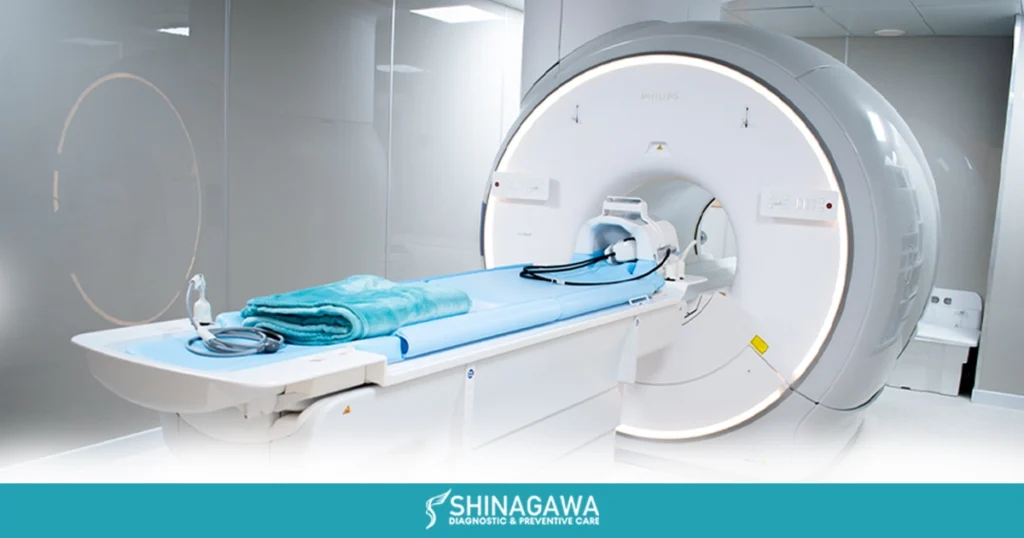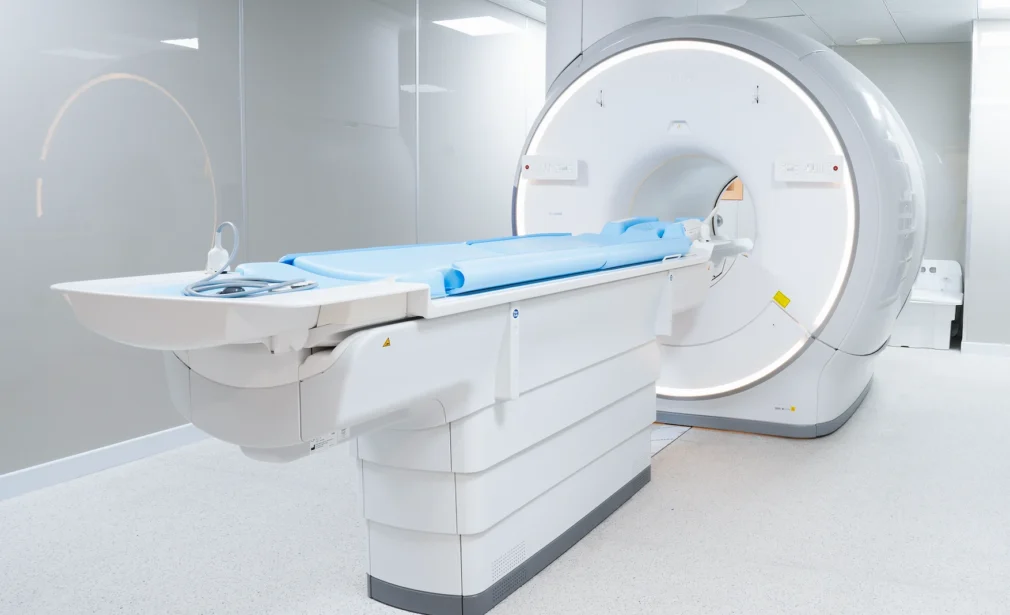Magnetic Resonance Imaging (MRI) is a powerful, non-invasive diagnostic tool that provides detailed images of organs, tissues, and the nervous system. It plays a crucial role in preventive healthcare by detecting potential health issues at an early stage, allowing for timely intervention before symptoms worsen.
*Note: A doctor’s request is required before proceeding with the imaging procedure to ensure that the test is necessary for your condition. If you do not have a doctor’s request, you may book a consultation with us to secure one.
Testing Time: 30 Minutes
Recommended for
Individuals with a family history of neurological disorders like tumors, multiple sclerosis, or stroke risk.
Ideal for those experiencing persistent headaches, dizziness, joint pain, or muscle weakness.
Individuals undergoing cancer screening to detect tumors or abnormal growths in the brain, spine, or other soft tissues.
Athletes or individuals prone to injuries to assess ligament, tendon, and muscle damage before it leads to long-term complications.
Benefits
Identifies abnormalities in the brain and spinal cord before symptoms become severe.
Detects early signs of muscle tears, ligament injuries, and arthritis, enabling proactive treatment.
Helps identify blockages, aneurysms, or cardiovascular conditions that may lead to heart disease or stroke.
Unlike X-rays and CT scans, MRI uses magnetic fields and radio waves, making it a safer option for frequent monitoring. With Shinagawa’s helium-free technology in its MRI Machine, patients can feel more patient comfort, with first high-performance, wide-bore.
Testing Time: 30 Minutes
Recommended for
Individuals with a family history of neurological disorders like tumors, multiple sclerosis, or stroke risk.
Ideal for those experiencing persistent headaches, dizziness, joint pain, or muscle weakness.
Individuals undergoing cancer screening to detect tumors or abnormal growths in the brain, spine, or other soft tissues.
Athletes or individuals prone to injuries to assess ligament, tendon, and muscle damage before it leads to long-term complications.
Benefits
Identifies abnormalities in the brain and spinal cord before symptoms become severe.
Detects early signs of muscle tears, ligament injuries, and arthritis, enabling proactive treatment.
Helps identify blockages, aneurysms, or cardiovascular conditions that may lead to heart disease or stroke.
Unlike X-rays and CT scans, MRI uses magnetic fields and radio waves, making it a safer option for frequent monitoring. With Shinagawa’s helium-free technology in its MRI Machine, patients can feel more patient comfort, with first high-performance, wide-bore.
Helium Free MRI Technology

Shinagawa’s Helium-Free MRI Technology, the first in the Philippines, revolutionizes diagnostic care with eco-friendly, safer, and faster imaging. It enhances accuracy, shortens scan times, and ensures a more comfortable patient experience, setting a new healthcare standard.
Our MRI Services
| Adrenals MRI | Ankle MRI (Left or Right) | Arm MRI (Left or Right) |
| Brain MRA | Brain MRI | Brain MRA + Brain MRI |
| Brain MRI + Brain MRA + Neck MRA | Breast MRI | Cervical Spine MRI |
| Cervico-Thoracic Spine MRI | Chest MRI | Elbow MRI (Left or Right) |
| Femur (Thigh) MRI (Left or Right) | Foot MRI | Fore-Arm MRI (Left or Right) |
| Hand MRI (Left or Right) | Hip MRI | Knee MRI (Left or Right) |
| Lower Abdominal MRI | Lumbar Spine / Lumbosacral MRI | Neck MRA |
| Neck/Nasopharynx MRI | Paranasal Sinuses MRI | Pelvic MRI (Women: Uterus, Ovaries) (Men: Prostate) |
| Sacroiliac Joint MRI | Shoulder MRI (Left or Right) | Temporo Mandibular Joint |
| Thoracic Spine MRI | Thoraco-Lumbar Spine MRI | Tibia/Fibula (Leg) MRI |
| Upper Abdominal (MRCP) MRI | Upper Abdominal MRI | Whole Abdominal MRI |
| Whole Spine MRI | Wrist MRI (Left or Right) |
Adrenals MRI
Ankle MRI (Left or Right)
Arm MRI (Left or Right)
Brain MRA
Brain MRI
Brain MRI + Brain MRA
Brain MRI + Brain MRA + Neck MRA
Breast MRI
Cervical Spine MRI
Cervico-Thoracic Spine MRI
Chest MRI
Elbow MRI (Left or Right)
Femur (Thigh) MRI (Left or Right)
Foot MRI
Fore-Arm MRI (Left or Right)
Hand MRI (Left or Right)
Hip MRI
Knee MRI (Left or Right)
Lower Abdominal MRI
Lumbar Spine / Lumbosacral MRI
Neck MRA
Neck/Nasopharynx MRI
Paranasal Sinuses MRI
Pelvic MRI
– Women: Uterus, Ovaries
– Men: Prostate
Sacroiliac Joint MRI
Shoulder MRI (Left or Right)
Temporo Mandibular Joint
Thoracic Spine MRI
Thoraco-Lumbar Spine MRI
Tibia/Fibula (Leg) MRI
Upper Abdominal (MRCP) MRI
Upper Abdominal MRI
Whole Abdominal MRI
Whole Spine MRI
Wrist MRI (Left or Right)
Health Package with MRI Imaging Exams
VIP Shinagawa Dock
VIP Shinagawa Dock stands as a premier health package at Shinagawa, offering comprehensive assessments tailored to prioritize digestive health and comprehensive evaluations for major diseases including heart disease, brain disorders, and cancer. It includes an endoscopy procedure offering patients a choice among four options based on their health goals and condition.
Double Reading by Japanese Medical Experts

Our MRI/MRA services related to the Brain has the double-reading method to ensure that no potential abnormalities are overlooked, allowing for timely intervention and improved patient outcomes in these critical areas of healthcare.
Book an appointment now

Inquire

Book

Confirm
Frequently asked questions
You need to secure a doctor’s request before undergoing an MRI procedure. This ensures that the procedure is appropriate for your health condition. If you do not have a request, you may consult with our doctors at Shinagawa. Once the doctor’s request is secured, you can proceed with the procedure.
If you have braces or dental implants, you will need to secure a clearance from your dentist to proceed with the procedure. This is to ensure that there will be no complications while the test is ongoing. Other than that, if you have metal implants, you may not be allowed to proceed with the MRI, unless you secure a doctor’s clearance that states you are safe to proceed with the MRI.
The MRI procedure can take minimum of 30 minutes to complete, until one hour or more, depending on the specific MRI procedure that can be performed. The MRI is very intricate in terms of developing its images, that’s why it required little to no movement at all while the examination is ongoing.
Brain MRI + Brain MRA can be performed on patients with a doctor’s request or approval.
An MRI is an excellent tool for preventive care, especially for individuals with chronic health conditions. If you’re unsure whether you need a CT scan, we recommend consulting with our doctor first.
No, a MRI a is non-invasive examination. To help you set your expectations, you will be laying down in a bed and there will be an emergency button you will hold onto throughout the examination so that you can easily communicate with our Medical Team whether you are feeling uncomfortable or if you want to stop the examination. You will also be wearing headphones wherein you can listen to any podcast, music, video, that you prefer. A helmet will also be placed on top of your head which has a mirror, so that you can see the medical team outside the examination room, making it less claustrophobic.
Patients with known claustrophobia may have difficulty undergoing MRI procedures. As much as possible, patients aged 17 and below can undergo an MRI; however, they must understand the importance of remaining still with little to no movement to ensure clear and accurate results.
You will receive your results via email within 3 to 7 working days, depending on the service availed of. Our Brain MRI + Brain MRA and Brain MRI + Brain MRA + Neck MRA results take seven working days due to the Double-Reading Method by Japanese Medical Experts. If you need a hard copy, you may request it in advance when booking an appointment through our Patient Care Line. If you have already completed your appointment and need a copy, you may request it here.


